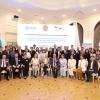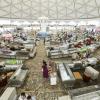News
Displaying Results 1 - 18 of 18
The potential of the creative economy to drive sustainable and resilient economic growth is high on the agenda of the participating States of the United Nations Special Programme for the Economies of Central Asia (SPECA), i.e., Afghanistan, Azerbaijan, Kazakhstan, Kyrgyzstan, Tajikistan,…
Responding to the request of the Governing Council of the United Nations Special Programme for the Economies of Central Asia (SPECA), UNECE is building the capacity of public and private experts in the SPECA participating States to use the semantic standards and reference data models of the UN…
Addressing the Tashkent International Investment Forum (2-3 May 2024), UNECE Executive Secretary Tatiana Molcean called for the mobilization of private sector investments to support the implementation of the Sustainable Development Goals (SDGs) and to foster regional cooperation in Central Asia.…
In recent years, the participating States of the United Nations Special Programme for the Economies of Central Asia (SPECA) - Afghanistan, Azerbaijan, Kazakhstan, Kyrgyzstan, Tajikistan, Turkmenistan, and Uzbekistan - have observed rapid growth in the number and impact of business incubators and…
With a long history of reliance on resource-based industries for growth, countries of the United Nations Special Programme for the Economies of Central Asia (SPECA) - Afghanistan, Azerbaijan, Kazakhstan, Kyrgyzstan, Tajikistan, Turkmenistan, and Uzbekistan - have embraced the power of innovation…
In the past years, Central Asia has been facing major climate-change related challenges – drought, floods, desertification, sandstorms, extreme cold and heat spells – and many more. Not only have these affected rural areas, but cities have been suffering, too. Accentuated by increased traffic…
During her recent two-day visit to Turkmenistan UNECE Executive Secretary Olga Algayerova spoke at international conference “Dialogue is a Guarantee of Peace” in Ashgabat and discussed areas of cooperation with the highest government officials, focusing on future circular, digital and green…
During its recent mission in Turkmenistan, a UNECE delegation presented a proposal for a new analytical project - “Trade and Innovation for Sustainable Development of Turkmenistan” - to the government and international stakeholders, aimed at supporting the country to enhance innovation governance…
The COVID-19 pandemic, the subsequent economic downturn, and the far-reaching negative effects of the war in Ukraine, have created additional development challenges for Central Asian economies. This includes the countries of the UN Special Programme for the Economies of Central Asia (SPECA),…
The COVID-19 pandemic and the war in Ukraine have disrupted global value chains and created new challenges for achieving the Sustainable Development Goals (SDGs) enshrined in the 2030 Agenda. This became particularly consequential for many economies in Central Asia, which have strong trade ties…
The Covid-19 pandemic continues to hit hard the countries of the United Nations Special Programme for the Economies of Central Asia (SPECA) and highlights the need to diversify from current, resource-dependent models of economic development. This will mean putting ‘innovation and technology that…
Countries in the UN Special Programme for the Economies of Central Asia (SPECA) are falling behind potential on many metrics of innovation performance. R&D spending remains below 1 per cent of GDP, almost entirely publicly funded, and SPECA countries rely extensively on natural resources,…
A small sub-set of small- and medium-sized enterprises – innovative, high-growth enterprises (IHGEs) – plays an outsize role in innovation and structural transformation as they spearhead experimentation with new ideas to create value, address challenges, and reduce transaction costs. A critical…
Transitioning towards a knowledge-based economy away from a resource-intensive model of economic growth is central for sustainable development among the seven countries of the UN Special Programme for the Economies of Central Asia (SPECA) - Afghanistan, Azerbaijan, Kazakhstan, Kyrgyzstan,…
Countries of Central Asia, the Caucasus and Eastern Europe have been hit hard by the socioeconomic impacts of the COVID-19 pandemic, which threatens to derail sustainable development progress in the region.
However, there is also a stronger momentum towards regional cooperation, and countries can…
Innovation has huge potential to drive sustainable development if supported by a vibrant innovation ecosystem. This requires effective linkages and collaboration at national level, and an innovation culture nurtured by a system of support to start ups and institutions such as business incubators.…
The COVID-19 pandemic has hit the economy hard. Global GDP is estimated to have fallen by 3.5 in 2020, and even more steeply in parts of the UNECE region. International trade has been disrupted. Progress towards the UN Sustainable Development Goals has slowed down at a time when it would be…
With the COVID-19 pandemic, Trade facilitation has acquired even greater importance for the land-locked countries of Central Asia, as it helps remove burdensome formalities for their trade and transport operations. Simplifying and digitalizing procedures helps diminish physical contacts along…



















